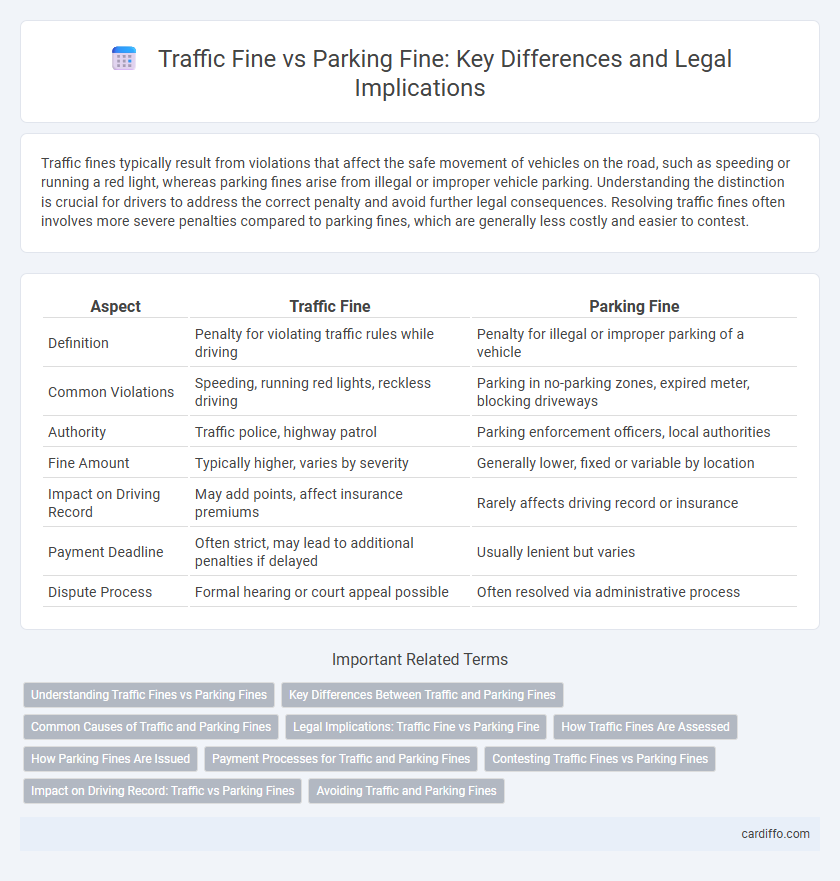Traffic fines typically result from violations that affect the safe movement of vehicles on the road, such as speeding or running a red light, whereas parking fines arise from illegal or improper vehicle parking. Understanding the distinction is crucial for drivers to address the correct penalty and avoid further legal consequences. Resolving traffic fines often involves more severe penalties compared to parking fines, which are generally less costly and easier to contest.
Table of Comparison
| Aspect | Traffic Fine | Parking Fine |
|---|---|---|
| Definition | Penalty for violating traffic rules while driving | Penalty for illegal or improper parking of a vehicle |
| Common Violations | Speeding, running red lights, reckless driving | Parking in no-parking zones, expired meter, blocking driveways |
| Authority | Traffic police, highway patrol | Parking enforcement officers, local authorities |
| Fine Amount | Typically higher, varies by severity | Generally lower, fixed or variable by location |
| Impact on Driving Record | May add points, affect insurance premiums | Rarely affects driving record or insurance |
| Payment Deadline | Often strict, may lead to additional penalties if delayed | Usually lenient but varies |
| Dispute Process | Formal hearing or court appeal possible | Often resolved via administrative process |
Understanding Traffic Fines vs Parking Fines
Traffic fines typically result from violations that endanger road safety, such as speeding or running a red light, whereas parking fines are issued for improper or illegal vehicle parking. Understanding the distinction helps drivers address infractions correctly and avoid escalating penalties. Traffic fines often carry heavier financial penalties and may affect driving records, while parking fines are usually limited to fixed fees.
Key Differences Between Traffic and Parking Fines
Traffic fines typically result from moving violations such as speeding, running red lights, or reckless driving, reflecting direct threats to road safety. Parking fines, however, arise from stationary infractions like illegal parking zones, expired meters, or obstructing traffic flow, primarily regulating lawful vehicle placement. The key difference lies in the nature of the offense: traffic fines address dynamic driving behavior, while parking fines govern static vehicle compliance with local regulations.
Common Causes of Traffic and Parking Fines
Traffic fines often result from violations such as speeding, running red lights, and reckless driving, which directly impact road safety. Parking fines typically arise from illegal parking in no-parking zones, expired meters, or blocking driveways, hindering traffic flow and emergency access. Understanding these common causes helps drivers avoid costly penalties and promotes safer, more efficient road use.
Legal Implications: Traffic Fine vs Parking Fine
Traffic fines typically carry more severe legal implications than parking fines, potentially affecting driving records and leading to increased insurance premiums or license suspensions. Parking fines generally result in monetary penalties without directly impacting driving privileges or criminal records. The enforcement of traffic fines often involves court appearances and possible points on a driver's license, whereas parking fines are resolved through administrative payment processes.
How Traffic Fines Are Assessed
Traffic fines are assessed based on the severity of the violation, which includes factors such as speeding, running red lights, or reckless driving. Law enforcement officers or automated systems document the infraction through radar guns, cameras, or eyewitness reports, determining the exact nature and extent of the offense. Fines vary depending on local regulations, previous violations, and whether the infraction endangered public safety.
How Parking Fines Are Issued
Parking fines are issued when a vehicle violates local parking regulations, such as exceeding time limits, parking in no-parking zones, or obstructing traffic flow. Enforcement officials use parking meters, signs, and surveillance cameras to detect infractions and record violations, often issuing tickets on the spot or via automated systems. These fines are designed to promote orderly parking and ensure public safety in urban areas.
Payment Processes for Traffic and Parking Fines
Traffic fine payment processes typically involve online portals, mobile apps, or in-person payment at authorized centers, allowing offenders to settle fines promptly to avoid additional penalties. Parking fine payments often offer more flexible options, such as payment via SMS, automated kiosks, or third-party vendors, tailored to the specific location and municipal regulations. Both traffic and parking fines require adherence to strict deadlines to prevent escalation, late fees, or potential legal action.
Contesting Traffic Fines vs Parking Fines
Contesting traffic fines often requires presenting evidence such as dashcam footage or witness statements to prove compliance with traffic laws, whereas disputing parking fines typically involves administrative appeals focused on procedural errors or unclear signage. Traffic fine contests may involve traffic court hearings where legal arguments about road safety and driver behavior are scrutinized, while parking fine appeals generally follow streamlined administrative processes without court appearances. Understanding the distinct procedures and evidence requirements for traffic versus parking fine disputes increases the likelihood of a successful challenge.
Impact on Driving Record: Traffic vs Parking Fines
Traffic fines typically have a more severe impact on a driving record compared to parking fines, often resulting in points that can lead to increased insurance premiums or license suspension. Parking fines usually do not add points or affect driving records but can incur financial penalties if unpaid. Understanding the distinction helps drivers manage their legal and financial responsibilities more effectively.
Avoiding Traffic and Parking Fines
Avoiding traffic and parking fines requires understanding local laws and regulations, including speed limits, no-parking zones, and time restrictions. Using apps with real-time traffic updates and parking availability alerts helps drivers stay compliant and reduce the risk of violations. Regularly checking for posted signs and maintaining awareness of surrounding enforcement cameras ensures timely adherence to all rules.
Traffic Fine vs Parking Fine Infographic

 cardiffo.com
cardiffo.com